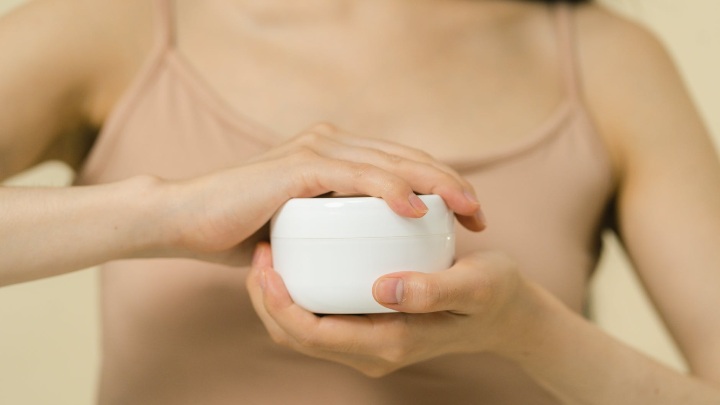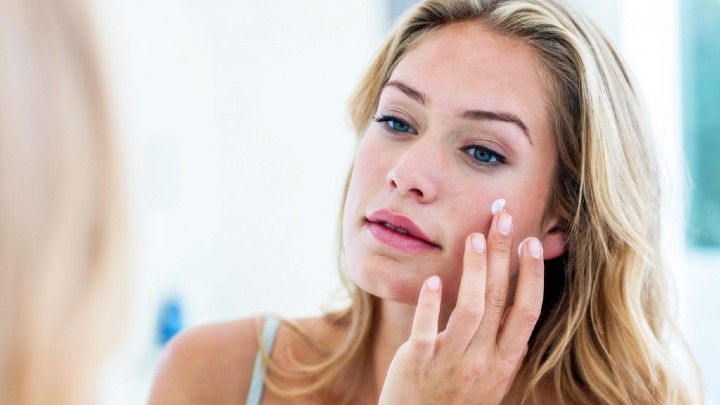If you have acne, you may be wondering whether using a moisturizer is a good idea or if it will worsen your condition.
The answer is everyone’s skin needs hydration to stay healthy and work effectively. If you have acne-prone or oily skin, it’s important to use a moisturizer to avoid worsening your breakouts.
To understand why moisturizing is essential for acne-prone skin, it’s important to understand what a moisturizer does and how it affects your skin.
What is a moisturizer?
A moisturizer is a skincare product that hydrates and protects the skin, helping it retain its natural moisture and preventing it from becoming dry.
It also stops the skin from producing excess oil, which helps prevent clogged pores and acne breakouts.
Moisturizers are made up of ingredients that help the outer layer of your skin hold in water. Some also contain ingredients that slow down water loss from the skin or fill in gaps between skin cells to make them softer and smoother.
There are many types of moisturizers available. They can be water, oil, or silicone-based and are available in lotions, creams, gels, and ointments. The most important thing is to choose one that works well with your skin type and concerns.
Is moisturizer good for acne?
The answer is yes.
Using a moisturizer is an important step in your morning and evening routine, even if you have acne.
When you have acne, it means you have inflamed pores that could become infected if the inflammation progresses. To prevent this from happening, moisturizers help to hydrate your skin and keep it plump, making it less likely for bacteria and dirt to penetrate your pores.
Besides hydrating your skin, moisturizers can also help to protect it from harmful environmental factors. Moisturizers form a protective barrier on the skin that prevents irritants and pollutants from entering the pores.
And when this protective barrier is in place, your skin will be much less likely to develop acne and other skin conditions.
Another benefit of using a moisturizer on acne-prone skin is that it may even help to reduce acne scarring. When your skin is dry, it is more likely to flake and crack. This can lead to inflammation — and inflammation causes acne scars.
A good moisturizer plays a key role in helping you achieve healthy, acne-free skin (this includes other parts of the body like the shoulder). You just need to be careful about the ingredients in your moisturizer. The best moisturizers for acne-prone skin have lightweight formulas and oil-free ingredients that won’t clog your pores.
What causes acne?
Most types of acne are caused by hormonal changes (specifically androgen hormones).
Hormonal changes cause glands to produce more oil, which increases the chances of pores clogging and acne developing.
Dehydration is another factor that causes acne. When your skin lacks water, it panics and produces more oil to compensate for the lack of moisture. This then leads to clogged pores, which are perfect breeding grounds for acne-causing bacteria.
Acne has also been directly linked to genetics (inherited from family members), diet, stress, lifestyle, and nutrition. For example, eating too many greasy foods and chocolate can increase your chances of having acne.
How do you choose a moisturizer for acne-prone skin?
If you have acne-prone skin, there are enough moisturizers that will hydrate your skin without clogging your pores.
Just keep these tips in mind when choosing a moisturizer for acne-prone skin:
- Avoid oil-based products. Some ingredients to stay away from include mineral oil, sunflower oil, coconut oil, and olive oil.
- Look for lightweight, gel-like textures. Thicker creams tend to clog pores (even those labeled as “noncomedogenic” or “oil-free”).
- Stick with non-fragranced or lightly fragranced products. Strong scents can irritate sensitive skin, so look for fragrance-free options or those labeled “unscented.”
- Pick moisturizers with salicylic acid or benzoyl peroxide. If you need additional acne treatment, these two ingredients help prevent new breakouts while clearing up existing blemishes.
- Get a prescription from your dermatologist. One of the best ways to choose a moisturizer is by getting a prescription from your dermatologist. They will suggest moisturizers that can help treat blemishes and prevent future ones from forming.
Tips for getting rid of acne
Change your pillowcases and sheets
This is the easiest thing to do. Wash your pillowcases and sheets every week and get new ones every three months.
Keep your hands off your face
Your hands can transfer dirt and bacteria from your fingers to your face, which is why it’s important to keep them away from your skin. The same goes for phones, which can also hold bacteria in their crevices.
Use over-the-counter acne treatments
Look for treatments containing benzoyl peroxide, salicylic acid, or retinol. These ingredients are effective at drying out pimples without causing too much irritation to the surrounding skin.
Add an exfoliant to your routine
Gentle exfoliation can help clear up acne, but don’t overdo it. Over-exfoliating can make acne worse by irritating and promoting inflammation in the skin.
Apply aloe vera gel to the skin twice daily
The nutrients in aloe vera gel help increase collagen production and treat scars more quickly. Aloe vera is also anti-inflammatory and can help reduce redness from acne scarring.
When applying aloe vera gel, be sure it’s pure aloe vera with no alcohol added, as alcohol can dry out the skin and make acne worse.
Don’t pop pimples
This one might be tough for you, but popping pimples does nothing but spread more bacteria on your face. If there’s an itch or irritation that you need to scratch, then use a clean tissue or washcloth instead of using your hands or fingernails.
FAQs

Can moisturizers cause breakouts?
Yes, they can.
If you break out from using a moisturizer, it may be because the moisturizer is too heavy for your skin. If this is the case, try a lighter moisturizer labeled oil-free or non-comedogenic (won’t clog pores).
Can moisturizers get rid of acne?
No, they can’t.
Moisturizers can help treat acne; however, they don’t get rid of acne on their own. To get rid of acne, you should pair your moisturizer with effective acne treatments like benzoyl peroxide and salicylic acid.
These ingredients can help kill the bacteria that cause acne, reduce swelling and redness, and remove excess oil from your skin.
How do you know if a moisturizer is right for you?
The best way to find out whether a particular moisturizer is right for you is to test it out.
Buy a smaller size or get a sample and try it out on a small patch of skin, like on the inside of your wrist or elbow.
If you don’t see any reactions after 24 hours, then apply it to your face and continue monitoring for any irritation or breakouts.
Conclusion
Moisturizers are essential for keeping your face hydrated, especially if you have acne-prone skin. They also help in reducing inflammation and strengthening the skin’s protective barrier so it can act as a natural defense against bacteria and other irritants.
Some moisturizers even have ingredients like niacinamide, hyaluronic acid, or salicylic acid, all of which are beneficial in fighting acne.
If you have acne and are looking for a way to clear it up, try including a good quality moisturizer in your routine.
Thanks for reading.
You can get more helpful beauty tips here on MBGON.
